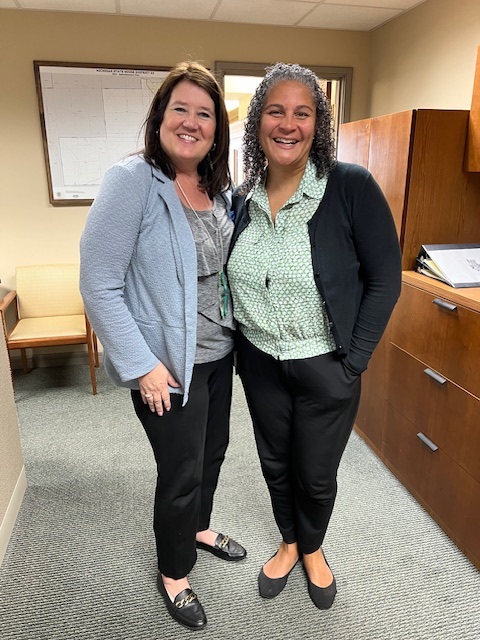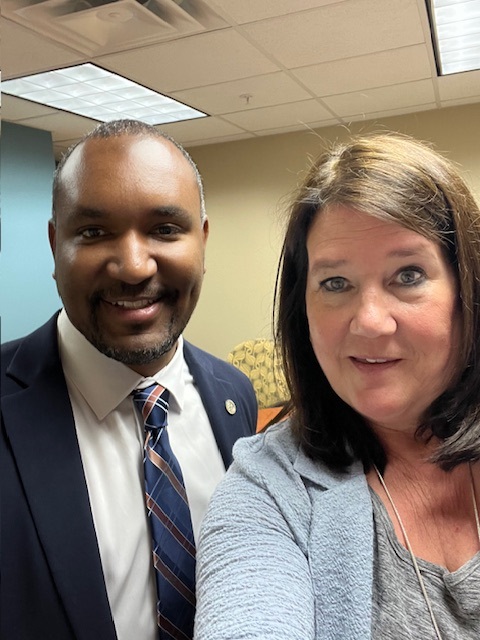The work of Catholic Social Services includes not just extending services; it also includes advocating for the needs of the persons we serve. Recently, our Child Advocacy Center (CAC) team were part of CAC Advocacy Day in Lansing.
The Children’s Advocacy Center of Michigan (CACMI) organized the event at the Capitol. Several Directors met with lawmakers within their district. We had three big asks for the lawmakers to support. The first was their support for a $ 3.5 Million one-time Allocation to CAC’s in the House MDHHS Budget. We are grateful that the $2 million Supplemental appropriation for CACs in 2023 has been left in the FY 2024/2025 budget by both the House and Senate. However, without additional funding, CACs are still left with a significant gap in support.
The Victims of Crime Act (VOCA) set up the Crime Victims Fund (CVF) in 1984. The CVF is a non-taxpayer source of funding that supports thousands of crime victim services providers serving millions of victims of crime annually and is supported by money from federal crime penalties to help victims, including children who are victims of abuse and trafficking. Deposits into the Crime Victims Fund are historically low and victim service agencies depend on this funding. CACs receive between $150 and $200 million in VOCA dollars annually, which is the largest single source of funding for these programs. Michigan’s VOCA funded award will be decreasing by 42% in 2025. To stabilize the loss in (VOCA) funding in 2025 and build upon the progress made, CACs needs sustained and reliable funding. Continued financial support is critical for expanding the capabilities of both emerging and established CACs, focusing on capacity building and long-term sustainability. The goal is to ensure that every child victim of sexual abuse in Michigan has access to the support and resources they need to heal and recover.
Secondly, we asked lawmakers to support Senate Bill 813 (Cherry). This is a bill to amend the 1961 PA 236, entitled “Revised Judicature Act of 1961” to allow the video recording of a child’s forensic interview to be admissible in the preliminary court hearing, in lieu of their in-person testimony. This bill has the support of the Prosecuting Attorney’s Association of Michigan (PAAM) and MDHHS.
Our final ask was support for House Bills 4482, 4483, and 4484. Under this legislation, the period of limitations would be altered, so that a person who is a victim of criminal sexual conduct (even if they were an adult) may file a civil lawsuit regarding the assault at any time before the later of these three events: ten years after the claim occurs; the individual reaches the age of 52 years – up from the current age limit of 28 years; or seven years after the date the individual discovers, or in the exercise of reasonable diligence should have discovered, both the individual’s injury and the causal relationship between the injury and the sexual assault – up from current three years. Current law states that it is not necessary for a criminal prosecution to have been brought because of the conduct, or that a conviction was obtained in any criminal prosecution that was brought. The bill further adds that a civil action to recover damages sustained because of CSC may be brought at any time without limitation, if a criminal prosecution is brought because of the conduct, and that prosecution results in a conviction for criminal sexual conduct. This legislation also revives certain civil claims. Under the bill, any claim of any individual who was a victim of CSC before the effective date of this bill is revived. That individual may commence an action to recover damages within the 2-year period after the effective date of this bill.
We are privileged to not just be able to serve our clients, but to amplify their voices, ensuring high quality and dignified care to everyone we serve. Learn more about WCAC at CSSW at Washtenaw Child Advocacy Center – Catholic Social Services (csswashtenaw.org)


